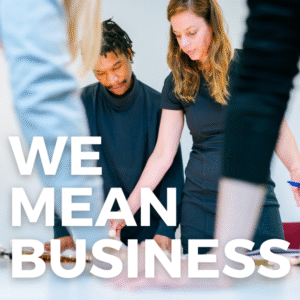

Ruby Arora interviews Todd Merkow, first general manager of FOX Sports Arizona and current strategic and operational consultant who also teaches sports journalism majors at the Cronkite School of Journalism. Ruby and Todd discuss Amazon emerging into NFL streaming and what journalists should be aware of and what to look out for in the future of sports streaming.
[Intro music]
Ruby Arora: Welcome to “We Mean Business.” I’m your host, Ruby Arora. This podcast is about something that affects all of us: business. Our culture and society are molded around business and what business leaders want. It impacts our daily lives more than we know. Here at the Reynolds Center we focus on business journalism, and we’re here acting as the liaison connecting business with journalism, allowing journalists to cover business better.
Today, we have Todd Merkow joining us. Todd, will you give us a little background, a little synopsis of your experiences?
Todd Merkow: Entrepreneurial started a content agency called Three Screens Media that was so early I’d have to explain to people what the three screens were, believe it or not. And so it was actually doing fairly well. I like to say it was at the elbow of the hockey stick. And then the recession hit, and everybody I was dealing with did an about-face on spending money on that end, which they should have actually doubled down and spent more money, but they didn’t know any better, so they pulled back. I ended up having to do a pivot. I became a consultant, doing everything across the collegiate space, eSports, pro-space, e-commerce, companies, kind of all across the board, dealing a lot with content and the ecosystem and strategy of content.
Arora: How would you say business, journalism and media engagement will change over the next five years, since you’re so specialized in a lot of data, media, engagement?
Merkow: So, you know, I think a lot of this. And, you know, I guess the other thing I didn’t mention here was teaching at Arizona State and theCronkite School of Journalism, and, you know, having the ability inside of this class to talk to journalism students about more of the foundation of business and the media and the foundation of sports business. And it’s all about following the money right at the end of the day, and understanding the fundamentals, the business fundamentals of whatever it is. And I think it’s really important in the foundation of all this, that journalists coming out of school and even journalists in the workforce today, whether they’ve been there for five years or thirty years, understand how trends are changing and how businesses are changing, and what the fundamentals mean inside of those changes.
Arora: So would you say you need a business background to go into business journalism?
Merkow: No, I wouldn’t say that. I think you need to be educated on it. You need to have a an understanding to be able to follow the stories accordingly and to extract the best parts of the story. You know, again, in this example that we saw today, I think, you know it would be nice if you were going to go down that pathway of being a business journalist, to get a major or minor or even a master’s? Yeah, sure, it would be helpful. It would make you dive deeper, and it would make your audience probably understand even more, because you have a greater understanding, and if you’re a good journalist and how you convey, that you’re conveying the right points of story and the simpler parts of the story to let somebody who might not know the business side how to grasp what’s going on. So yeah, I would say it’s an advantage, but it’s not necessary.
Arora: We all know Amazon is coming into the NFL realm of media. What do you think Amazon’s impact will be, and how it’ll disrupt bigger sports platforms like ESPN over the next decade?
Merkow: Good question. So I’m a big fan of watching Amazon. I’m a bigger fan of watching another e-commerce company in the sports space.
Arora: You like the underdogs?
Merkow: Well, I like the underdogs, but these guys are as big, in a sense, so I think the comparison here is Amazon versus Fanatics. And Amazon, I think, is the 10,000-pound gorilla that is sitting out there, ready to jump on anything that there’s an opportunity. Personally, I think they’re still positioned to make a sizable impact in sports. I think they’re taking too long, quite honestly, to make a decision if they really want to jump in or not, leaving the door open for Fanatics.
Arora: Aren’t they supposed to launch in the fall, though? The NFL media?
Merkow: Oh yeah, they’re in, but they could go bigger. Amazon is actually making its impact internationally. Far greater than its making in the U.S. So the question is, when does that conversion happen over here? And that’s what I say: Why are they waiting as long as they’re waiting? There was rumor they were going to buy the regional sports networks. Why didn’t they jump in and buy them then? They bought the Yes network that the Yankees on, or bought an investment in it. They invested in, but they didn’t jump in and buy the regional sports networks. Now, inevitably, could they? Could that happen one day? It’s possible, could Fanatics be that player too? Fanatics, I think they have 100 million consumer base, and they’re just looking for ways to leverage it. They’re going into the betting market, they’re going into the trading card market, licensing. They’re going to go in NFTs. And the natural progression here in the media space is to go somehow deliver content tom this subscription, content to this user base. So, you know, I think Amazon should be worried about them. I think everybody else should be worried about Amazon.
Arora: Since they have such a bigger international market, like you said, and then their priority should be making a more, a bigger foundation in the United States. So how would you say Amazon’s going to affect the media market?
Merkow: From a journalism perspective?
Arora: Business perspective, journalism perspective.
Merkow: Well, from a media perspective, it was upstating, I think it’ll be from a rights fee situation, and using their platform, you know, the large platform for distribution. From a journalism perspective, I don’t know if anything stands out to me at the moment that they’re doing. You know, we can flip this and look at Apple, and I think the fact that Apple, inside their major league baseball deal, is going to do a nightly show around baseball. They bring journalism back into place, sports journalism. They’re going to do look-in, light look-ins. They’re going to do highlight stuff. So they’re going to, they’re going to lean on sports journalism to whatever degree around their Friday Night Baseball package. How it affects with Amazon, I’m not sure at the moment. You would think with their ownership of, you know, journalism entities, The Washington Post, right? Yeah, they would have some thoughts around this, but that that’s not necessarily how they might think either. They also own the largest gaming platforms with the largest audience in Twitch. Are they going to incorporate that? Somehow, you would think they would. But who knows?
Arora: Just to satisfy my own curiosity, would you say Amazon hasn’t jumped into every all their potential yet, like you said, because they’ve been waiting to get into the regional markets? Do you think that’s just because they’re not ready, or it’s a strategy and a bigger plan that we’re not seeing yet?
Merkow: Oh, another good question. I don’t know. Yeah, I don’t know, because I don’t know what they’re holding back on. I mean, they’re doing a little more than dipping their toe in the water now here in the United States. So I don’t know what’s holding them back. They have plenty of cash. They have a platform that can be flexible in doing whatever it is they wanted to do.
Arora: That’s why I’m thinking, it’s purposely.
Merkow: Well, and then you mentioned the RSNs and that was a decision at the time that I don’t know how they evaluated that business. To me, it had, you know, some factors to it that was like, if I had been running that regional sports network business, I would have been so excited for the idea the acquisition of Amazon, because it would have given me e-commerce opportunities on day of game, like I could deliver to the house my partner, with my partner. So in Arizona, if the Diamondbacks game was on and they were doing a bobblehead night and you were watching, and can prove you’re watching, I couldliterally deliver you a bottle at home. I mean, these are things that you know, just give you different ways of being creative and engaging with the sports fan. I mentioned Twitch. Twitch was another one. I mean, how would you take regional sports network and do ancillary programming or companion programming to your live broadcast on Twitch? I mean, you’re reaching an audience that’s incredibly difficult to reach in you know, who’s sitting on Twitch, mostly younger generations. And so utilizing those assets are just completely invaluable. And I don’t know why they haven’t made that decision yet. I mean, maybe they hire me one day and I’ll help them get in there, but I think at some point they’ll they’ll jump in. I just don’t know if it’ll be too late to what they can grab.
Arora: Thank you for joining us today, Todd. I greatly appreciate it. Thanks to everyone for listening. Make sure you subscribe and join us next time, as we talk about more business topics and what journalists need to know.
[Outro music]




Two Minute Tips
Every Tuesday we send out a quick-read email with tips for business journalism. Sign up now and get one Tuesday.
